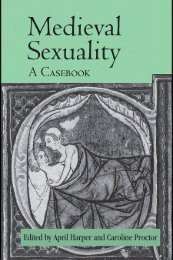Festive Satire: Julian's Misopogon and the New ... - Julian Emperor
Festive Satire: Julian's Misopogon and the New ... - Julian Emperor
Festive Satire: Julian's Misopogon and the New ... - Julian Emperor
You also want an ePaper? Increase the reach of your titles
YUMPU automatically turns print PDFs into web optimized ePapers that Google loves.
for its political activity in <strong>the</strong> 380s.50 Yet 'audacious behaviour in <strong>the</strong> hippodrome' was not<strong>the</strong> end of <strong>the</strong> matter. 'Worst of all', wrote Libanius, 'we are held to have put on a shockingdance (cjpx+~8ar ~ ~ ~ 6 <strong>and</strong> 3 5 ) turned a religious festival into an excuse for a disreputableracing entertainment'.sl It is easy to imagine what Libanius meant by 'disreputable racingentertainment', but one wonders what sort of dancing he had in mind. 'To answer thisquestion we must consider <strong>the</strong> private or unofficial side of <strong>the</strong> traditional Kalendsfestivities.Libanius describes <strong>the</strong>se in an encomium of <strong>the</strong> holiday.sz The whole empirecelebrates; everywhere <strong>the</strong>re is feasting <strong>and</strong> merriment. Everyone gives gifts. What peopleusually struggle to gain, <strong>the</strong>y now consider it a gain to spend. Overeating <strong>and</strong> o<strong>the</strong>rnormally forbidden activities are now entirely correct, <strong>and</strong> regret for <strong>the</strong>m is out of place.Boys need not fear <strong>the</strong> pedagogue nor slaves <strong>the</strong>ir master, while <strong>the</strong>y spend <strong>the</strong> daygambling <strong>and</strong> shirking work unpunished. All legal business shuts down; even prisonerslook cheerful. The holiday can persuade a fa<strong>the</strong>r in mourning for his son to take food <strong>and</strong>go to <strong>the</strong> baths. It reconciles citizen with citizen, housewife with housewife, <strong>and</strong> settlesfamily feuds. And it teaches everyone, even <strong>the</strong> emperor, to give money away. In ano<strong>the</strong>rspeech Libanius gives us crucial details about <strong>New</strong> Year's Eve:s3Night falls, but no one sleeps. The common people engage in songs, wild dancing, <strong>and</strong>mocking jests. They do this even in <strong>the</strong> commercial district, barging in, pounding on doors,shouting inamockery. They make it impossible to sleep. And some people are angry with what<strong>the</strong>y hear, but o<strong>the</strong>rs consider it an occasion for laughter, <strong>and</strong> no one present is so sour <strong>and</strong>austere that he censures <strong>the</strong>se goings-on: even he who is too self-controlled to laugh breaks outlaughing.Antioch's greatest Christian orator took a different view. In a <strong>New</strong> Year's homily hecondemns '<strong>the</strong> diabolical all-night festivities, <strong>the</strong> satiric jests, <strong>the</strong> abuse, <strong>the</strong> nocturnaldances, <strong>the</strong> whole ridiculous comedy'.~" Asterius, <strong>the</strong> bishop of Pontus, deplores <strong>the</strong>rapacious trick-or-treating of <strong>the</strong> gangs of nocturnal revellers, who terrorized <strong>the</strong> houses ofrespectable people on <strong>New</strong> Year's Eve. Poor city-dwellers had to buy <strong>the</strong>m off with coinssaved to feed <strong>the</strong>ir families. Country people who ventured into <strong>the</strong> streets were forced togive up <strong>the</strong>ir money <strong>and</strong> assaulted with verbal <strong>and</strong> physical mockery.55One might expect Christian homilists to disapprove of secular <strong>New</strong> Year's celebrations,but it is particularly unfortunate that in 363 <strong>the</strong> emperor was not amused. For <strong>the</strong>Kalends, with its collective feasting, its massive ritual of gift-giving both horizontally <strong>and</strong>vertically on <strong>the</strong> social scale,s6 was a time for healing social rifts <strong>and</strong> softening socialtensions, when a reversal or temporary suspension of <strong>the</strong> familiar dichotomies thatnormally articulate <strong>the</strong> social structure (male <strong>and</strong> female, ruler <strong>and</strong> subject, slave <strong>and</strong> free)might open <strong>the</strong> way for <strong>the</strong> experience of community in a larger sense.57 Even Christiansso On <strong>the</strong> claque at Antioch see J. H. W. G. Liebe- orations until 378. It might also be objected that <strong>the</strong>schuetz, Antioch. City <strong>and</strong> Imperial Administration in claque could not have been operative in <strong>the</strong> hippo<strong>the</strong>Later Roman Empire (1972), 208-18, 278-80. Of drome, since it had not yet become amalgamated withcourse, Libanius has every reason to persuade <strong>Julian</strong> <strong>the</strong> circus factions. But ~lfisopogon339D implies thatthat only a few idlers were responsible for <strong>the</strong> disturb- under Constantius <strong>the</strong> <strong>the</strong>atre <strong>and</strong> hippodrome hadances. In his speech to <strong>the</strong> senate at Antioch he been under a joint imperial administrator (whose jobanticipates <strong>the</strong>ir objection that those involved were <strong>Julian</strong> <strong>the</strong>n eliminated), <strong>and</strong> it was precisely this sort offoreigners without explicitly endorsing it (Or. xvr. administrative change that promoted <strong>the</strong> consolidation31-4). The claque seems to have contained dissolute of <strong>the</strong> claque <strong>and</strong> <strong>the</strong> factions (Cameron, op. cit. (n.youth of good family as well as foreign desperadoes(Lib., Or. XLI. 9). One might compare <strong>the</strong> organized321, 214-29).51 Or. xv. 19, trans. Norman.misconduct of <strong>the</strong> student gangs at A<strong>the</strong>ns university,<strong>the</strong> eversores of Augustine's Carthage (Confessions 111.5% or. IX.53 Descriptio v. 6.3), <strong>and</strong> <strong>the</strong> 'Abbeys of Youth', young men's organiza- 54 Ai yap 81apohl~ai -navvu~iS~~ ai y~vopsval ri)p~pov,tions dedicated to misrule <strong>and</strong> satiric chan'oan in ~ a ira u~wppa-ra, ~ a ai i AolSopial, ~ a ixopsiaial aimedieval <strong>and</strong> early modern France (N. Z. Davis, VUKTEPIV~~, ~ ai) i ~a~ayiAaoro~ d~fi ~wpcpSia(JohnSociety <strong>and</strong> Culture in Eayly ~lfodern France (1965), Chrysostom, PG 48. 954).104 ff.). For <strong>the</strong> age of <strong>the</strong> offenders see also n. 18 55 ~m~hsva3ov~al, KW~W~O~VTU~ h~yol~fpy015 ~ a i (PCabove. It might be objected that <strong>the</strong> earliest explicit 40. 220, in a sermon of I January 400).evidence for <strong>the</strong> claque's role in political acclamations s6 Lib., Or. rx. 8-9; Descr. v. 5.comes from Libanius' speeches of <strong>the</strong> 38os, <strong>and</strong> that 36357 See Victor Turner, 'Liminality <strong>and</strong> Communitas'is simply too early. But with <strong>the</strong> Christian reaction after in The Ritual Process: Structure <strong>and</strong> Anti-Structure<strong><strong>Julian</strong>'s</strong> death, Libanius went into semi-retirement. We (1969), passim.have no letters from <strong>the</strong> period 365-88, <strong>and</strong> no public













